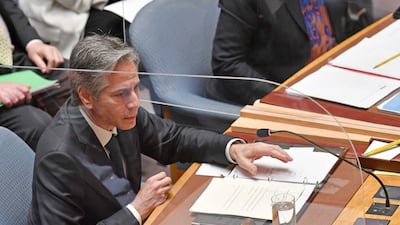Live updates: follow the latest news on Russia-Ukraine
US Secretary of State Antony Blinken accused Russia on Thursday of using food as a weapon in Ukraine by holding “hostage” the food supply for not only millions of Ukrainians, but millions around the world who rely on the country's exports.
Addressing the UN Security Council, Mr Blinken appealed to Russia to stop the blockade of Ukrainian ports.
Russia invaded Ukraine on February 24 to carry out what Moscow calls a “special military operation”.
“The Russian government seems to think that using food as a weapon will help accomplish what its invasion has not — to break the spirit of the Ukrainian people,” he said.
“The food supply for millions of Ukrainians and millions more around the world has quite literally been held hostage by the Russian military.”
The war in Ukraine has caused global prices for grains, cooking oils, fuel and fertiliser to soar.
Russia and Ukraine together account for about one third of global wheat supplies. Ukraine is also a major exporter of corn, barley, sunflower oil and rapeseed oil, while Russia and Belarus — which has backed Moscow in its war in Ukraine — account for more than 40 per cent of global exports of potash, a crop nutrient.
Russia's UN ambassador Vasily Nebenzya said it was “absolutely false” that Russia was to blame for a global food crisis that had been brewing for several years.
He accused Ukraine of holding foreign vessels in its ports and mining the waters while the Russian military has repeatedly tried to open safe corridors for vessels.
Mr Nebenzya blamed western sanctions imposed on Moscow over the Ukraine war for having a chilling effect on Russian exports of food and fertiliser.
But Mr Blinken rejected Russian claims that sanctions were fuelling the food crisis.
“The decision to weaponise food is Moscow's and Moscow's alone,” Mr Blinken said. “As a result of the Russian government's actions, some 20 million tonnes of grain sit unused in Ukrainian silos as global food supply dwindle, prices skyrocket, causing more around the world to experience food insecurity.”
UN Secretary General Antonio Guterres is trying to broker a “package deal” that will allow Ukraine to resume food exports through the Black Sea and revive Russian food and fertiliser production to world markets.
“There is enough food for everyone in the world. The issue is distribution, and it is deeply linked to the war in Ukraine,” Mr Guterres told the council on Thursday.
















































